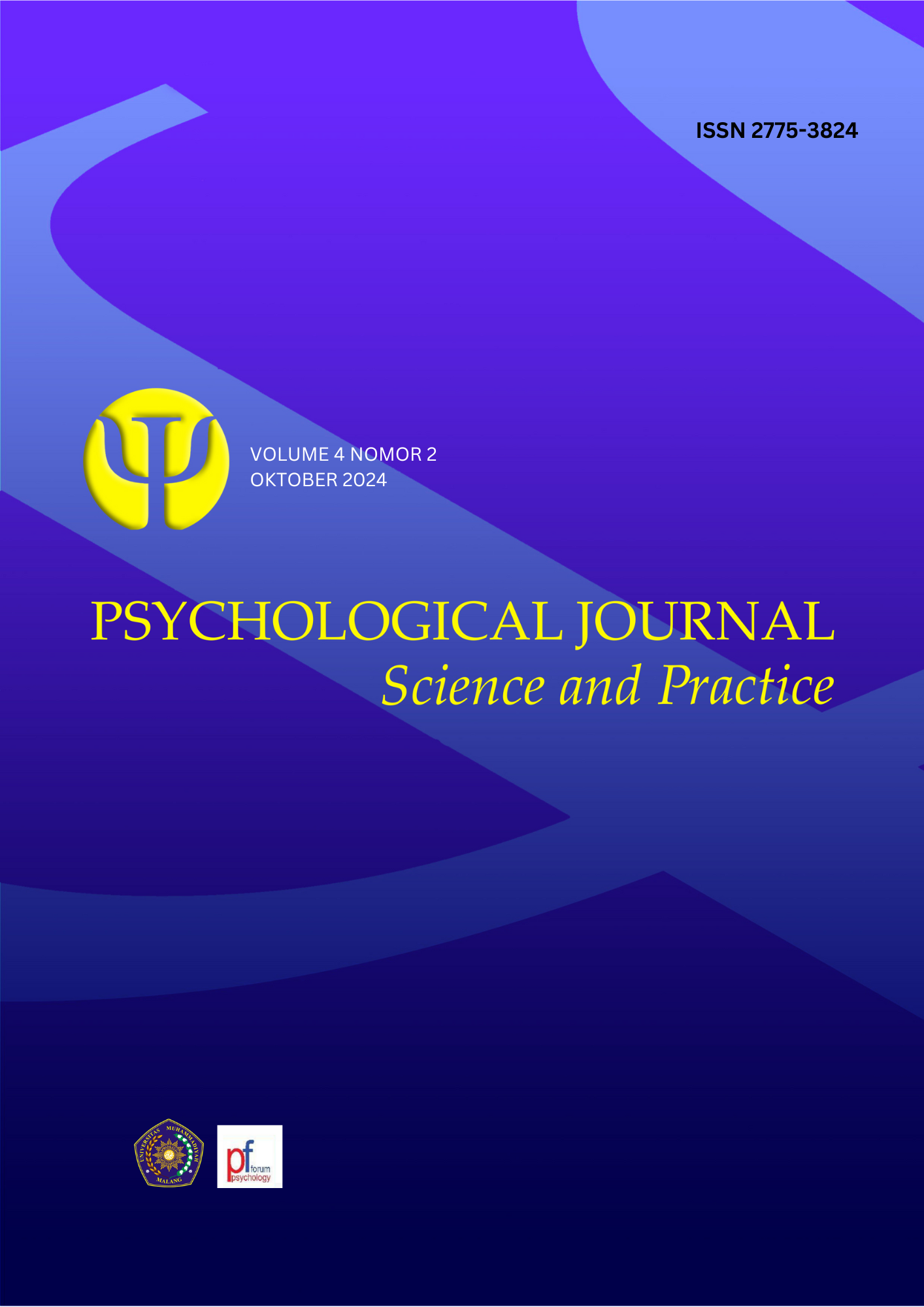Kompetensi sosial sebagai kunci kualitas persahabatan remaja: Mengungkap eran attachment dengan orang tua
DOI:
https://doi.org/10.22219/pjsp.v4i2.37557Keywords:
Child’s attachment to parents, social Competence, quality of Friendship, Child’s attachment to parents, social Competence, quality of FriendshipAbstract
This study explores the role of social competence in enhancing the quality of adolescent friendships through parental attachment. Adolescence is a crucial developmental stage characterized by significant physical and psychological changes, where peer relationships, particularly friendships, play a vital role in shaping identity. Previous research has highlighted the importance of parental attachment in influencing adolescents’ social interactions and their ability to form meaningful friendships. Social competence, which refers to the ability to navigate social situations effectively, is considered a key mediator between parental attachment and the quality of friendships. This research aims to delve into how social competence mediates the relationship between parental attachment and the quality of adolescent friendships. The study uses quantitative methods with a purposive sampling technique to collect data from 166 adolescents, utilizing various scales to measure parental attachment, social competence, and friendship quality. Results indicate that social competence significantly mediates the relationship between parental attachment and the quality of friendships, confirming its critical role in fostering positive peer relationships during adolescence.
Downloads
References
Abdillah, M. H., Anindita, W. D., Permatasari, S., Nabillah, B. R., & Mujidin, M. (2020). Description Of Friendship Quality In Yogyakarta Student Jurnal Psikologi : Media Ilmiah Psikologi, 18(02). https://doi.org/10.47007/jpsi.v18i02.92
Achmad Rizal Nurhuda, Nurul Fitria, & Moch. Isa Ansori. (2023). Kompetensi Sosial (Societal Comptance). Jurnal Riset dan Inovasi Manajemen, 1(3), 10–23. https://doi.org/10.59581/jrim-widyakarya.v1i3.762
Adibsereshki, N., Nesayan, A., Gandomani, R. A., & Karimlou, M. (2015). The Effectiveness of Theory of Mind Training On the Social Skills of Children with High Functioning Autism Spectrum Disorders. 9(3).
Agustian, M. F. N. (2023). Analysis the quality friendship Analisis Kualitas Pertemanan Terhadap Remaja. Shine: Jurnal Bimbingan Dan Konseling, 3(2), 56–
https://doi.org/10.36379/shine.v3i2.316
Allen, J. P., Grande, L., Tan, J., & Loeb, E. (2018). Parent and Peer Predictors of Change in Attachment Security From Adolescence to Adulthood. Child Development, 89(4), 1120–1132. https://doi.org/10.1111/cdev.12840
Amati, V., Meggiolaro, S., Rivellini, G., & Zaccarin, S. (2018). Social relations and life satisfaction: The role of friends. Genus, 74(1), 7.
https://doi.org/10.1186/s41118-018-0032-z
Aneesh, A., Sia, S. K., & Kumar, P. (2024). Parent-child relationship and psychological well-being of adolescents: Role of emotion regulation and social competence.
Journal of Human Behavior in the Social Environment, 34(2), 153–171. https://doi.org/10.1080/10911359.2023.2221321
Aulya Purnama, R., & Wahyuni, S. (2018). Kelekatan (Attachment) pada Ibu dan Ayah Dengan Kompetensi Sosial pada Remaja. Jurnal Psikologi, 13(1), 30. https://doi.org/10.24014/jp.v13i1.2762
Bukowski, W. M., Bagwell, C., Castellanos, M., & Persram, R. J. (2020). The Encyclopedia of Child and Adolescent Development (1 ed., hlm. 1–11). Wiley. https://doi.org/10.1002/9781119171492.wecad403
Carcedo, R. J., Vázquez-Iglesias, P., Parade, S., Herreros-Fraile, A., & Hervalejo, D. (2023). Social anxiety mediates the effect of attachment to parents on friendships and loneliness during the college transition. Current Psychology,
(13), 10457–10467. https://doi.org/10.1007/s12144-022-03868-4
Crawford, A. M., & Manassis, K. (2011). Anxiety, social skills, friendship quality, and peer victimization: An integrated model. Journal of Anxiety Disorders, 25(7), 924–931. https://doi.org/10.1016/j.janxdis.2011.05.005
Damayanti, P., & Haryanto, H. (2019). Kecerdasan emosional dan kualitas hubungan persahabatan. Gadjah Mada Journal of Psychology (GamaJoP), 3(2), 86. https://doi.org/10.22146/gamajop.43440
Delgado, E., Serna, C., Martínez, I., & Cruise, E. (2022). Parental attachment and peer relationships in adolescence: A Systematic Review. International Journal of Environmental Research and Public Health, 19(3), 1064. https://doi.org/10.3390/ijerph19031064
Fangidae, S. I., & Antika, E. R. (2023). Pengaruh Kualitas Persahabatan terhadap Kebahagiaan Siswa SMA. 12.
Febrianti, L. D., Fasikhah, S. S., & Prasetyaningrum, S. (2023). Pengaruh kompetensi emosi terhadap kualitas persahabatan pada mahasiswa. Journal of Islamic and Contemporary Psychology (JICOP), 3(1s), 269–279. https://doi.org/10.25299/jicop.v3i1s.12368
Fernandes, C., Monteiro, L., Santos, A. J., Fernandes, M., Antunes, M., Vaughn, B. E., & Veríssimo, M. (2020). Early father–child and mother–child attachment relationships: Contributions to preschoolers’ social competence. Attachment & Human Development, 22(6), 687–704. https://doi.org/10.1080/14616734.2019.1692045
Fosenburg, S. (2018). Investigating friendship qualities in high ability or achieving, typically-developing, ADHD, and twice-exceptional youth [Doctor of Philosophy, University of Iowa]. https://doi.org/10.17077/etd.hh343cqn
Goleman, D. (2007). Social intelligence: The new science of human relationships; [beyond IQ, beyond emotional intelligence] (1st. paperback ed). Bantam Books.
Hayes, A. F., & Preacher, K. J. (2014). Statistical mediation analysis with a multicategorical independent variable. British Journal of Mathematical and Statistical Psychology, 67(3), 451–470. https://doi.org/10.1111/bmsp.12028
Keizer, R., Helmerhorst, K. O. W., & Van Rijn-van Gelderen, L. (2019). Perceived quality of the mother–adolescent and father–adolescent attachment relationship and adolescents’ self-esteem. Journal of Youth and Adolescence, 48(6), 1203–1217. https://doi.org/10.1007/s10964-019-01007-0
Kristiyanti, M. (2023.). PENERBIT : CV. PUSTAKA STIMAR AMNI SEMARANG.
Kusumaningsih, A., & Febriani, A. (2022). The role of social skills on bullying behavior tendency with friendship quality as mediator. Jurnal Psikologi, 49(2), 163. https://doi.org/10.22146/jpsi.69779
Lana, C. D., & Indrawati, K. R. (2021). Peranan kualitas persahabatan dan kecerdasan emosional pada kebahagiaan remaja. Jurnal Psikologi Udayana, 8(1), 95. https://doi.org/10.24843/JPU.2021.v08.i01.p10
Lee, P. H., & Shin, Y. (2018). The relationship between attachment and children’s friendship network and friendship quality: Focusing on the Mediating Effect of Empathy. Family and Environment Research, 56(2), 123–131. https://doi.org/10.6115/fer.2018.009
Lestari, Y. I., & Palasari, W. (2021). Hubungan antara kualitas persahabatan dengan kebahagiaan pada santri pondok pesantren iik riau: the relationship between the quality of friendship and happiness in santri pondok pesantren IIK riau. Jurnal Psikologi Jambi, 5(2), 17–27. https://doi.org/10.22437/jpj.v7i2.12637
Livingston, L. A., Colvert, E., Bolton, P., & Happé, F. (2019). Good social skills despite poor theory of mind: Exploring compensation in autism spectrum disorder. Journal of Child Psychology and Psychiatry, 60(1), 102–110. https://doi.org/10.1111/jcpp.12886
Lopes, B. de J. (t.t.). Friendship quality scale: Adaptation and Psychometric Evidence. 7.
Matson, J. L. (Ed.). (2009). Social behavior and skills in children. Springer New York. https://doi.org/10.1007/978-1-4419-0234-4
Memba, G. V., & Ostrov, J. M. (2023). Prospective relations of temperament and peer victimization with changes in social competence in early childhood: The Moderating Role of Executive Functioning. Child & Youth Care Forum, 52(6), 1349–1370. https://doi.org/10.1007/s10566-023-09737-w
Mendelson, M. J., & Aboud, F. E. (1999). Measuring friendship quality in late adolescents and young adults: McGill Friendship Questionnaires. Canadian Journal of Behavioural Science / Revue Canadienne Des Sciences Du Comportement, 31(2), 130–132. https://doi.org/10.1037/h0087080
Mulyana, F. R., Suherman, A., Mahendra, A., Subarjah, H., & Hidayat, Y. (2023).
Enhancing social skills: Reliability and validity of the Indonesian version of SSIS-RS among physical education students. Journal Sport Area, 9(1), 11–19. https://doi.org/10.25299/sportarea.2024.vol9(1).13492
Nurhuda, A. R., Fitria, N., & Ansori, M. I. (2023). Kompetensi Sosial (Societal Comptance). 1(3).
Özerk, G., Özerk, K., & Silveira-Zaldivara, T. (2021). Developing Social Skills and Social Competence in Children with Autism. Lnternational Electronic Journal of Elementary Education, 13(3), 341–363. https://doi.org/10.26822/iejee.2021.195
Perry, M. A., Creavey, K., Arthur, E., Chance Humer, J., Lundgren, P. J., & Rivera, I. (2020). Cultivating emotional intelligence in child welfare professionals: A
systematic scoping review. Child Abuse & Neglect, 110, 104438. https://doi.org/10.1016/j.chiabu.2020.104438
Proborini, R. (2019). Hubungan antara persahabatan dengan attachment ayah dan ibu. ANFUSINA: Journal of Psychology, 2(1), 19–30.
https://doi.org/10.24042/ajp.v2i1.4151
Qu, Y., Cao, L., & Wang, X. (2021). Diversified Psychological Mechanisms in the Formation of Tourist Destination Attachment. Journal of Hospitality & Tourism Research, 45(4), 697–719. https://doi.org/10.1177/1096348020973399
Riggio, R. E., & Reichard, R. J. (2008). The emotional and social intelligences of effective leadership: An emotional and social skill approach. Journal of Managerial Psychology, 23(2), 169–185. https://doi.org/10.1108/02683940810850808
Rizka, C. M., & Kurniawati, F. (2022). Peran keterampilan sosial terhadap kualitas pertemanan pada anak berkebutuhan khusus di sekolah dasar inklusif. Inquiry: Jurnal Ilmiah Psikologi, 9(1), 46–64. https://doi.org/10.51353/inquiry.v9i1.223
Santrock, J. W. (2019). Life-span development (Seventeenth edition). McGraw-Hill Education.
Sari, S. L., & Devianti, R. (2018). Kelekatan orangtua untuk pembentukan karakter anak. 1(1).
Shabira, F., & Uyun, Q. (2023). Harga diri dan kebersyukuran sebagai prediktor citra tubuh pada remaja perempuan penggemar K-pop. Psikologika: Jurnal Pemikiran dan Penelitian Psikologi, 28(1).
https://doi.org/10.20885/psikologika.vol28.iss1.art7
Shodiq, F., Kosasih, E., & Maslihah, S. (2020). NEED TO BELONG DAN OF MISSING OUT MAHASISWA PENGGUNA MEDIA SOSIAL INSTAGRAM. JURNAL PSIKOLOGI INSIGHT, 4(1), 53–62.
https://doi.org/10.17509/insight.v4i1.24595
Taborsky, B., & Oliveira, R. F. (2012). Social competence: An evolutionary approach.
Trends in Ecology & Evolution, 27(12), 679–688. https://doi.org/10.1016/j.tree.2012.09.003
Tipton, L. A., Christensen, L., & Blacher, J. (2013). Friendship Quality in Adolescents with and without an Intellectual Disability. Journal of Applied Research in Intellectual Disabilities, 26(6), 522–532. https://doi.org/10.1111/jar.12051
Tooley, U. A., Bassett, D. S., & Mackey, A. P. (2021). Environmental influences on the pace of brain development. Nature Reviews Neuroscience, 22(6), 372–384. https://doi.org/10.1038/s41583-021-00457-5
Trigueros, R., Padilla, A., Aguilar-Parra, J. M., Lirola, M. J., García-Luengo, A. V., Rocamora-Pérez, P., & López-Liria, R. (2020). The Influence of Teachers on Motivation and Academic Stress and Their Effect on the Learning Strategies of University Students. International Journal of Environmental Research and Public Health, 17(23), 9089. https://doi.org/10.3390/ijerph17239089
Waldrip, A. M., Malcolm, K. T., & Jensen‐Campbell, L. A. (2008). With a Little Help from Your Friends: The Importance of High‐quality Friendships on Early Adolescent Adjustment. Social Development, 17(4), 832–852. https://doi.org/10.1111/j.1467-9507.2008.00476.x
Wijayanti, N. T. (2021). Kompetensi emosi pada remaja. Psychological Journal: Science and Practice, 1(1), 16–22. https://doi.org/10.22219/pjsp.v1i1.15828
Zimmermann, P. (2004). Attachment representations and characteristics of friendship relations during adolescence. Journal of Experimental Child Psychology, 88(1), 83–101. https://doi.org/10.1016/j.jecp.2004.02.002
Downloads
Published
How to Cite
Issue
Section
License
Copyright (c) 2024 Zuhaimi Santari Hayus

This work is licensed under a Creative Commons Attribution-ShareAlike 4.0 International License.
Authors who publish with Psychological Journal: Science and Practice (PJSP) agree to the following terms:
- For all articles published in Psychological Journal: Science and Practice (PJSP), copyright is retained by the authors. Authors give permission to the publisher to announce the work with conditions. When the manuscript is accepted for publication, the authors agree to automatic transfer of the publishing right to the publisher.
- Authors retain copyright and grant the journal right of first publication with the work simultaneously licensed under a Creative Commons Attribution-ShareAlike 4.0 International License that allows others to share the work with an acknowledgment of the work's authorship and initial publication in this journal.
- Authors are able to enter into separate, additional contractual arrangements for the non-exclusive distribution of the journal's published version of the work (e.g., post it to an institutional repository or publish it in a book), with an acknowledgment of its initial publication in this journal.
- Authors are permitted and encouraged to post their work online (e.g., in institutional repositories or on their website) prior to and during the submission process, as it can lead to productive exchanges, as well as earlier and greater citation of published wor (See The Effect of Open Access).
This work is licensed under a Creative Commons Attribution-ShareAlike 4.0 International License.








